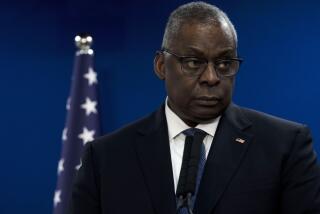Pentagon was on defensive in Afghanistan review
Reporting from Washington — U.S. military officials clamped down on internal Pentagon security during President Obama’s Afghanistan strategy review to prevent leaks and stem an erosion of trust between the White House and Defense establishment, according to military officials.
Military leaders limited attendance at Pentagon meetings, excluding nonessential staff, and warned officers and others that no one was to discuss the administration’s war council meetings or related assignments, officials said.
Crucial to the strategy review was top U.S. commander Gen. Stanley A. McChrystal, who faces lawmakers on Capitol Hill today for the first time since taking command of allied forces in Afghanistan in June and is likely to face a range of questions, both from Republican critics and from Democrats who oppose an escalation. Obama last week announced that 30,000 additional troops would be sent to Afghanistan; McChrystal had recommended 40,000.
Officials said two episodes in September had contributed to a “clash of cultures” between civilian and military participants in the review: the leak of an assessment by McChrystal, and testimony by the chairman of the Joint Chiefs of Staff, Adm. Michael G. Mullen, that additional troops “probably” were necessary.
“When you take the chairman’s testimony and you have the leak of McChrystal’s assessment, this is the beginning of suspicion and unhelpful tension on the civil-military side,” said a military officer, speaking on condition of anonymity.
The officials, briefing reporters on aspects of the strategy review, said they could not determine how McChrystal’s report was leaked, but said a Sept. 21 Washington Post article disclosing its findings came a day after congressional committees had been given the assessment.
McChrystal was criticized by administration officials for a speech in Europe in early October about his assessment and was summoned to meet with Obama on Air Force One.
Obama’s troop buildup order last week will bring the U.S. deployment in Afghanistan to about 100,000. Obama said the troops would start to return home in July 2011, but administration and military officials have not specified how long the extra troops would be in place or when other U.S. troops would leave.
U.S. Marines and Afghan security forces continued their assault on a Taliban stronghold in the Now Zad valley of Helmand province, where they uncovered large caches of explosives, guns and material for roadside bombs, the Marines said Monday.
The operation is an effort to eliminate the Taliban presence in the province, which the insurgents once controlled. A dozen suspected militants have been killed and several captured.
There were no reports of Marine or Afghan casualties, the Marines said.
During the strategy review, military officials worried that White House officials were not sharing all of their thinking.
“There was discomfort here about the sense we couldn’t be trusted with information,” said the military official.
By the end, however, the officer said that military officials believe they gave the White House what they wanted.
“If this was the test of the civil-military relationship, it was a test we passed,” the officer said.
The official said that there was never an attempt to pressure the administration.
Times staff writers Tony Perry in Kabul, Afghanistan, and Christi Parsons in Washington contributed to this report.
More to Read
Sign up for Essential California
The most important California stories and recommendations in your inbox every morning.
You may occasionally receive promotional content from the Los Angeles Times.









